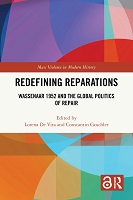Redefining Reparations
Proposal review
Wassenaar 1952 and the Global Politics of Repair

Language
EnglishAbstract
This edited volume offers a new interpretation of the historically momentous 1952 Wassenaar negotiations between representatives of the Federal Republic of Germany, Israel, and the Jewish Claims Conference to negotiate reparations, compensation, and restitution in the aftermath of the Holocaust.
Wassenaar 1952 marked the first time that reparations were the subject of negotiations between representatives of victims and perpetrators following mass human rights violations and genocide. The reparations program that Germany established after the Holocaust eventually became a point of reference for many calling for reparations to deal with the aftermath of other atrocities – from colonialism to slavery – in contexts as diverse as Namibia, the United States, and beyond. Combining perspectives from history, anthropology, international relations, and transitional justice, this volume reassesses the course and global legacy of these negotiations.
The book’s holistic and nuanced intervention in the study of the politics of repair makes it essential reading for students of history, law, transitional justice, and political science interested in the complex topic of reparations.
Keywords
Claims Conference,1953 Luxembourg Agreement,International Criminal Court,Israelpolitik,Pablo de Greiff,Reparations for Nazi VictimsDOI
10.4324/9781003377146ISBN
9781003377146, 9781032454634, 9781032454658Publisher
Taylor & FrancisPublisher website
https://taylorandfrancis.com/Publication date and place
2025Imprint
RoutledgeSeries
Mass Violence in Modern History,Classification
European history
Middle Eastern history
Social and cultural history
Second World War
Modern warfare
c 1938 to c 1946 (World War Two period)
The Holocaust
Europe
c 1940 to c 1949
